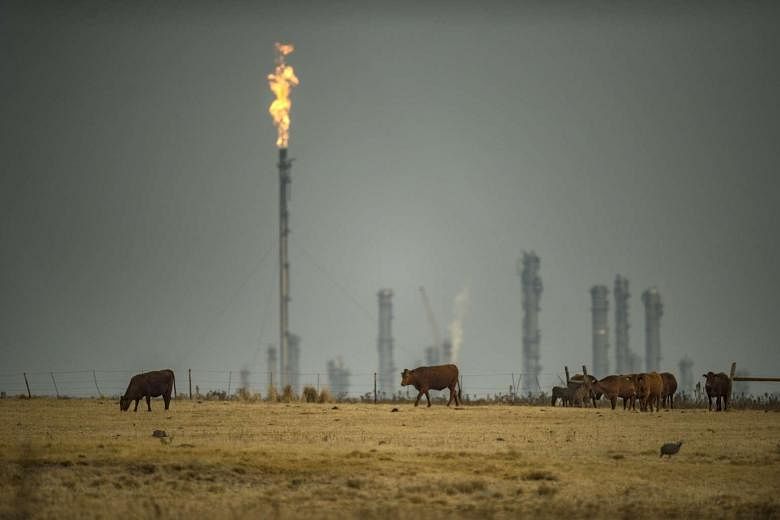LONDON (BLOOMBERG) - The world's central bankers just got a helping hand from the world's oil ministers.
As the European Central Bank delivers less monetary stimulus than investors sought and with the Federal Reserve set to tighten next week, the world economy may find support instead from the weakest oil price in more than six years.
West Texas Intermediate is trading at about US$36.92 a barrel on Tuesday after the Organisation of Petroleum Exporting Countries chose not to limit output last week, extending the commodity's decline from its June 2014 peak of US$107.73 and this year's high of US$62.58 in May.
While its earlier slide failed to provide the economic pickup some anticipated, economists at UniCredit Group AG, Commerzbank AG and Societe Generale SA are still banking on cheaper fuel to spur spending by consumers and companies in 2016.
"On net, central bankers should take this as a positive," said Peter Dixon, an economist at Commerzbank in London. "This does help to stimulate demand by leaving a little bit of money in the pocket and providing a feel-good factor."
At Societe Generale, Michala Marcussen, global head of economics, reckons every US$10 drop in the price of oil lifts global growth by 0.1 percentage point. She estimates that since 2014, the world has enjoyed a windfall equivalent to 2 per cent of gross domestic product it would otherwise have spent on crude.
"Our biggest relief last week was that OPEC decided no output cut, promising consumers inexpensive oil for longer," said Ms Marcussen.
Even though falling oil may weaken the inflation rates central bankers are struggling to lift, Erik Nielsen, chief economist at UniCredit Bank, said it was important to recognize that it's "'good' disinflation, because it stems from supply rather than demand and so should raise real income, thereby propelling consumption and the recovery."
"A drop in energy prices is the equivalent of a tax cut, with no implications for debt," he said, adding that faster expansions as a result should end up bolstering prices too and so investors should be wary of wagering on a deterioration in inflation.
Some central bankers are seeing the upside of cheaper oil too. Jens Weidmann, president of the Bundesbank, on Dec. 3 objected to the ECB's additional easing by saying "the significant energy price declines in fact are supporting the recovery." Fed Bank of San Francisco President John Williams said last week the effects of falling oil on headline inflation should also soon "peter out."
Not all are upbeat. Neil MacKinnon, global macro strategist at VTB Capital Plc, noted the previous decline in oil failed to ignite global growth. Among the reasons why not were that U.S. shale companies cut back hiring and investment, while American consumers chose to save rather than spend the "oil dividend".
Producers also took a hit to their current and budget deficits; recycling fewer petrodollars may have undermined financial markets.
"My concern is that rather than being a positive, further declines could actually be a negative if they create a vicious circle of reduced output, employment and investment," said Mr MacKinnon. "That weighs on the economic outlook and will have consequences for the central banks." In the case of the ECB, Jim Reid, head of fundamental strategy at Deutsche Bank AG, said it may find itself under further pressure from investors to act if fuel costs leave inflation stranded beneath its target of just below 2 per cent.
"If oil stays low well into early 2016 it's likely the market pressure on the ECB to ease further will rise regardless of whether it's the right thing to do or not," he said.
After lifting its benchmark from near zero next week - the first increase since 2006 -, the Fed may also use oil prices as reason not to raise rates quickly in 2016, said Gabriel Sterne, an economist at Oxford Economics Ltd.
On the whole central banks will welcome OPEC's decision, said David Carbon, chief economist at DBS Bank Ltd. in Singapore.
"Because lower prices follow from greater supply, this is a good thing, not a bad thing," he said. "The world's central banks should cheer greater crude supply, not fear it."
While acknowledging the past disappointment, Ed Yardeni, president of Yardeni Research Inc. in New York, is also betting on a reversal next year.
"For now, there is more evidence that the drop in oil prices is depressing the global economy on balance," he said. "We expect that the balance will turn more stimulative in 2016 once oil prices bottom and consumers pinch themselves and start spending their windfalls more noticeably."

